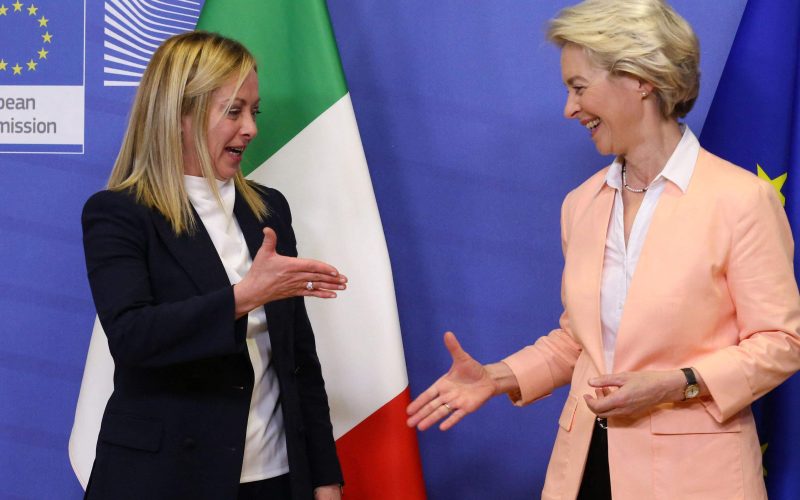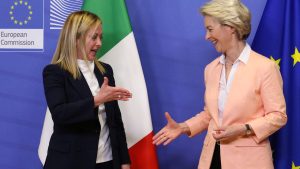In her recent statements, Giorgia Meloni, leader of Italy’s Brothers of Italy party, has raised concerns about the stability of the majority supporting Ursula von der Leyen’s second term as President of the European Commission. This article examines the context, implications, and reactions surrounding Meloni’s warning.
Background
Election of Ursula von der Leyen
Ursula von der Leyen’s journey to becoming the President of the European Commission amid a tumultuous selection process highlighted divisions within the EU member states. Her term began amidst both optimism and skepticism about her ability to navigate the complex political landscape of the European Union.
Political Landscape in the EU
The composition of the European Parliament and the dynamics among member states play crucial roles in determining the strength of von der Leyen’s mandate. The shifting alliances and ideological differences among political groups have shaped her leadership challenges.
Giorgia Meloni’s Concerns
Fragility of Majority Support
Giorgia Meloni has pointed out vulnerabilities in the coalition backing von der Leyen, emphasizing the potential for fractures over key policy decisions and leadership issues. Her warnings underscore deeper tensions within the EU’s political spectrum.
Critique of Policy Direction
Beyond concerns over majority stability, Meloni has critiqued specific policy directions proposed by von der Leyen, highlighting areas of disagreement that could further strain the coalition’s cohesion.
Implications for von der Leyen’s Leadership
Leadership Challenges
The warnings from Meloni highlight the ongoing challenges faced by von der Leyen in maintaining consensus among member states and political groups. These challenges are exacerbated by external pressures and internal dissent.
Policy Agenda and Legislative Outlook
The ability of von der Leyen to advance her policy agenda, including priorities such as climate change, economic recovery, and EU integration, heavily relies on maintaining a stable majority. Meloni’s warnings could influence the Commission’s strategic approach to garnering support.
Reactions and Responses
EU Member States and Political Groups
Reactions from other EU member states and political groups vary, reflecting divergent views on von der Leyen’s leadership and the future direction of EU policies. These responses shape the broader narrative surrounding her second term.
Analysis Table: Stability of Majority Support
| Factor | Description | Impact |
|---|---|---|
| Coalition Composition | Diversity of political ideologies and national interests | Determines cohesion and policy alignment |
| Leadership Style | Von der Leyen’s approach to consensus-building and decision-making | Influences trust and support among allies |
| Policy Priorities | Alignment with EU member states’ domestic agendas | Affects willingness to support initiatives |
| External Influences | Geopolitical factors and global economic conditions | Shapes EU’s strategic priorities |
Comparative Table: Meloni’s Concerns vs. Reality
| Concerns Raised by Meloni | Current Reality | Implications |
|---|---|---|
| Fragility of Majority Support | Ongoing challenges in maintaining consensus among diverse political factions | Risk of gridlock in decision-making |
| Policy Direction Critique | Disagreements over key policy initiatives and legislative priorities | Potential delays in policy enactment |
Conclusion
Giorgia Meloni’s caution regarding the ‘fragile majority’ supporting Ursula von der Leyen’s second term reflects broader uncertainties within the European Union’s political dynamics. As von der Leyen navigates these challenges, her ability to secure stable support will be critical in shaping the EU’s future trajectory amidst internal and external pressures.











